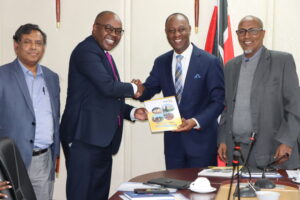KAM engages Principal Secretary State Department for Livestock

26/07/2023: The leather and footwear sector at KAM has a representation from 3 sub-sectors: Tanneries, footwear manufacturers, and leather goods manufacturers.
Today, KAM engaged the Principal Secretary, State Department for Livestock, Jonathan Mueke, to discuss and address challenges facing the leather and footwear sector in Kenya.
The global leather industry produces approximately 23 billion square feet annually. 65% is utilized in the footwear manufacturing industry, 14% in furniture, 10.2% in automobile interiors, 10% in garments, and 8% in other leather products (World Bank, 2015). Additionally, it is projected that the global leather goods market will experience a growth rate of 6.2% between 2020 and 2025.
KAM Chief Executive Anthony Mwangi highlighted the Association’s commitment to strengthening the link between agriculture and manufacturing through the concept of Agriculture for Industry (A41) one of the 4 pillars in our Manufacturing Priority Agenda (MPA 2023). “The integration between agriculture and the leather industry can promote sustainable practices, such as responsible sourcing of hides and skins from livestock and supporting local farmers who play a crucial role in the supply chain.”
“Kenya possesses significant opportunities for the advancement of its leather industry. Currently, this sector creates employment for 17,000 people, with 7,000 in formal and 10,000 in informal roles. However, there’s potential to create up to 100,000 jobs.” remarked Mr Mwangi
KAM Leather and Footwear sub-sector Chair, Rao Sambasiva enumerated some of the challenges that threaten the sustainability of the sector including, the shortage of raw hides and skins, deteriorating quality, unpredictable fiscal policy among others.
PS State Department for Livestock, Jonathan Mueke observed that the government has recognized the leather and footwear industry as a crucial component of the Bottom-Up Economic Transformation Agenda (BETA). He added that, in order to enhance the sector’s competitiveness, it is imperative to scale-up, effectively manage input costs, and produce quality goods.
Additionally, he noted that the government shall develop a specialized curriculum in TVET institutions to offer training in evidence-based and practical investment planning, with the aim of boosting investments in the leather and footwear sector.
Looking for elevation? KAM lifts you up.
- Direct technical assistance
- Capacity building programmes
- Networking and mentorship
- Industry insights & analysis
- Trade & export development services
